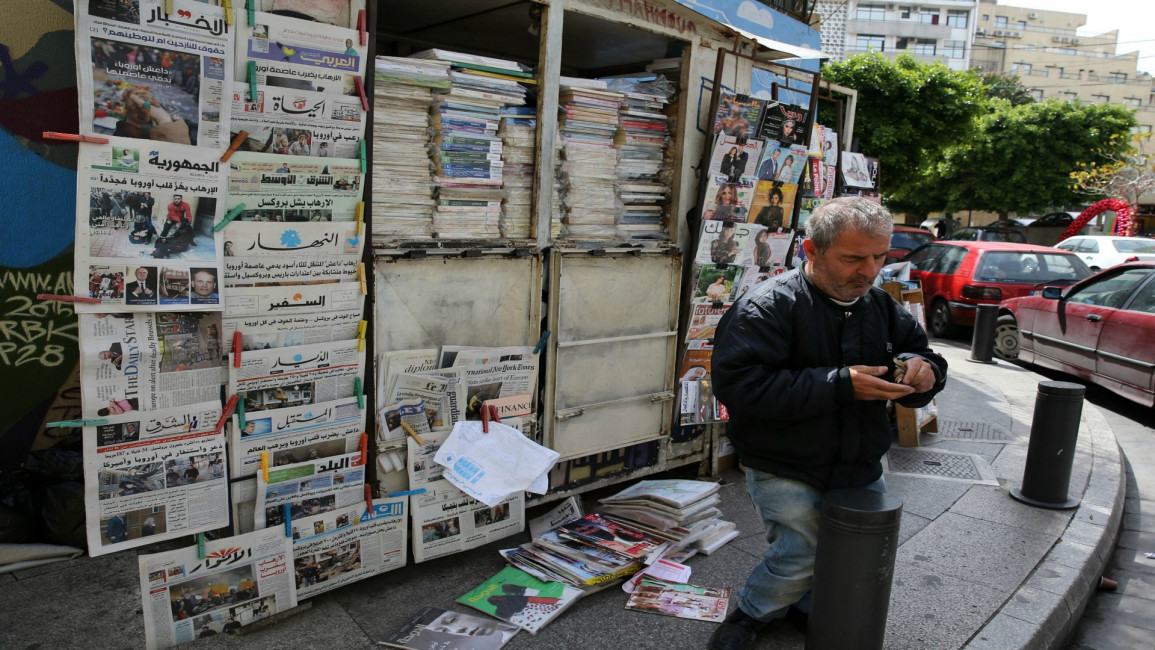
Media crisis in Lebanon: political or economic?
A financial crisis plaguing Lebanese media institutions has reached its peak, with several prominent newspapers announcing imminent drastic measures to avoid closure. After 42 years of publishing, As-safir newspaper stated it would discontinue both its print and online editions soon due to the absence of funding.
Similarly, An-nahar newspaper appears to be moving towards online publishing, 82 years after it first started. Al-liwaa has also opened the door for resignations following its inability to pay wages.
But the financial troubles are not limited to the above institutions, with many others being unable to cover expenses in the absence of adequate external funding. Whereas the increased worldwide threat to print newspapers over the past decade has contributed to these problems, the malaise affecting Lebanese media is also the product of an inability to introduce modern foundations for autonomous press. As such, media outlets remain hostage to political agendas imposed by regional powers.
Sidelining Lebanese politics
The financial difficulties that Lebanese newspapers are facing today are directly correlated with regional political transformations. With the increased investment of regional powers in various wars over the past few years, politics in Lebanon has been completely suspended until the dust settles.
The stagnation has produced itself in a complete deadlock that has slowed down political institutions, while the country held onto a fragile balance of power. The postponement of presidential and parliamentary elections reflect this deadlock.
 |
Lebanese media outlets remain hostage to political agendas imposed by regional powers. |  |
Since the upsurge in sectarian and political polarization after 2003, the Lebanese media have enjoyed the funds of regional actors. But the sidelining of Lebanese politics today manifested itself in funds shortage. The media crisis is then the latest episode in the Lebanese political deadlock.
But whereas financial difficulties relate fundamentally to a disinterest in Lebanese politics, it also sheds light on a predicament in media outlets given their subservience to funders for the past decades.
Independent media and the battle for public opinion
The threat to print newspapers has presented a problem for media worldwide, with several prominent outlets choosing to rely exclusively on electronic media or to find alternate means for funding. In the Lebanese case, however, self-sustenance among newspapers had already been a problem and was only exacerbated when reliance on foreign funds increased.
The lack of funds reveals a continued failure to produce self-sustaining media outlets, a precondition for maintaining a degree of autonomy. The danger of this financial dependence has manifested itself in a form of political allegiance, through a promise to propagate political agendas upheld by regimes.
Perhaps the ideal goal of shaping public opinion for the purpose of practicing continued surveillance on the ruling classes is far-fetched. It not only fails empirically in scrutinising current media models, but it also fails theoretically if we are to recognise the role institutions play in reaffirming or challenging power relations in society. However, pragmatism does not necessarily lead to subservience.
The success of media organisations is measured in their ability to balance such demands and simultaneously upholding a socially responsible role, rather than succumbing completely to the dictates of funders.
 |
The media crisis is then the latest episode in the Lebanese political deadlock. |  |
In addition to the issue of autonomy, the lack of funds is also telling when it comes to the political economy of the Middle East. Whatever function we allot to newspapers in particular, and to the media in general, the absence of funding shows a shift in the spending channels of political actors.
Political economy, for the most part, has been aimed at battlefronts rather than public discourse. Indeed, the “battle” for public opinion is considered to be a battle, with very little regard for appealing to the other’s adherents, given the complete submission to sectarian divisions.
Under the pretext of pushing for democratic change, sponsors of media outlets end up pressuring for divisive narratives. Instead of transforming this antagonistic discourse through encouraging public conversation, funders have come to aggravate internal conflicts.
Lebanese media have mostly served the purpose of justifying conflict. If we are to move beyond this war narrative towards socially responsible media, we must begin with an organic reshaping of public opinion towards trans-sectarian and inclusive political culture. This goal, however, remains far-fetch in a political economy sustained by divisive interest groups.
Karim Barakat is an instructor of philosophy in the American University of Beirut.
Opinions expressed in this article remain those of the author and do not necessarily represent those of The New Arab, its editorial board or staff.




